Governing property, making the modern state - PSI424
Governing property, making the modern state - PSI424
Governing property, making the modern state - PSI424
You also want an ePaper? Increase the reach of your titles
YUMPU automatically turns print PDFs into web optimized ePapers that Google loves.
al-muqasama. Al-Ramli judges that <strong>the</strong><br />
people of <strong>the</strong> village have <strong>the</strong> right to expel<br />
<strong>the</strong> cultivator.<br />
94 Ibid. p. 96.<br />
95 Ebussuud judges that <strong>the</strong> land of<br />
Şam was haraciye, see el-Üskübî, Zahir<br />
ül-Kudat, in Akgündüz: Kanunnameler,<br />
vol. 9, p. 432, mesele 256.<br />
96 The kanun is formal on <strong>the</strong> question;<br />
see Milli Tetebbular Mecmuası i/2<br />
(1903), p. 305: ‘ama … evkaf reayasında<br />
bu kanun icra olunmaz’.<br />
97 Al-Ramli cites in justification <strong>the</strong><br />
two compendia of Ibn Nujaim and his<br />
bro<strong>the</strong>r, al-Bahr al-ra’iq and al-Nahr<br />
al-ra’iq: Al-Fatawa al-khairiya, vol. 1,<br />
pp. 99–100. Both Johansen: The Islamic<br />
Law and Cuno: ‘Was <strong>the</strong> land of Syria miri<br />
or mulk?’ interpret <strong>the</strong> doctrinal choices of<br />
<strong>the</strong> Syrian ulema as representing regional<br />
landed interests against <strong>the</strong> officials of<br />
<strong>the</strong> central <strong>state</strong>. This example would not<br />
support such an interpretation: at issue is<br />
an attempt by both <strong>the</strong> mutawalli of <strong>the</strong><br />
waqf and <strong>the</strong> sibahi of <strong>the</strong> <strong>state</strong> to return<br />
cultivators to <strong>the</strong>ir plots.<br />
98 Al-Faradi’s epistle is ZAL.6879, fols<br />
1–56a; al-Nabulusi’s epistle is in Majmu‘<br />
mushtamil ‘ala 41 risala, SK.Çelebi Abdullah<br />
Efendi 385/33, Risalat takhyir al-‘ibad<br />
fi sukna al-bilad, fols 264b–270 and<br />
ZAL.4008, fols 42–4. It has been published<br />
and translated by Aladdin, ‘Deux fatwas<br />
du Šayh ‘Abd al-Ġanī al-Nābulusī’, Bulletin<br />
d’Etudes Orientales xxxix–xl (1987–88),<br />
pp. 7–37.<br />
99 ZAL.6879, fol. 5a: ‘wa-mithlu-hu<br />
fi Abi ’l-Su‘ud rahima-hu al-malik alma‘bud’.<br />
100 Ibid., fol. 5b, refers to what are<br />
known today as maqasid al-qur’an: hifz<br />
al-anfus wa-’l-ansab fa-’l-a‘rad fa-’l-‘uqul<br />
fa-’l-amwal.<br />
101 Ibid. fol. 13a.<br />
102 Ibid. fols 13b–17b.<br />
103 Ibid. fols 17b–20b.<br />
104 Ibid. fols 20b–21b.<br />
105 Ibid. fols 23a–34b.<br />
106 Ibid. fols 34b–35a.<br />
251<br />
107 Ibid. fols 35a–40a.<br />
108 Ibid. fols 40a–56a.<br />
109 Rafeq ‘The Syrian ‘ulama’’,<br />
p. 24, judges that <strong>the</strong> reference is to <strong>the</strong><br />
‘Damascene Shafi‘i Mufti Taqy al-Dīn<br />
al-Husni’ 1053–1129/1643–1717. The reference<br />
in al-Farazi, al-Nabulusi and Hamid<br />
al-‘Imadi (see Mughni al-mustafti ‘an su’al<br />
al-mufti, ZAL.5655, fol. 329a where <strong>the</strong><br />
name is given as al-Taqi al-Husni) may be<br />
to Taqi ’l-Din Abu Bakr b. Muhammad<br />
b. ‘Abd al-Mu’min al-Husni al-Husaini<br />
al-Shafi‘i al-Dimashqi (752–829AH/1351–<br />
1426). In Kitab Qam‘ al-nufus wa-ruqyat<br />
al-manus, SK.Bagdatlı Vehbi Efendi 649,<br />
fols 71b–82b, al-Husni condemns <strong>the</strong><br />
godlessness (kufr) of rulers and of those<br />
jurists who justify extortionate taxation<br />
and appropriation of land. Al-Husni’s<br />
Kitab Qam‘ al-nufus belongs to a genre<br />
of oppositional mirror-for-princes tracts;<br />
in his great legal work Sharh al-tanbih,<br />
SK.Ayasofya 1213, vol. 5, fol. 22a he argues<br />
that rulers and judges may <strong>the</strong>mselves be<br />
bugha, i.e. in opposition to <strong>the</strong> true imam,<br />
and hence to be disobeyed. The vagueness<br />
of <strong>the</strong> references by al-Faradi, al-Nabulusi<br />
and Hamid al-‘Imadi make it impossible to<br />
judge whe<strong>the</strong>r <strong>the</strong> earlier or later al-Husni<br />
is at issue; in any case, <strong>the</strong>re is manifestly a<br />
long tradition of Shafi‘i condemnation.<br />
110 Risalat takhyir, SK.Çelebi Abdullah<br />
Efendi 385/33, fol. 267a.<br />
111 Ibid. fol. 267a: ‘li-anna ’linsan<br />
min tab‘i-hi mahabbat watani-hi<br />
wa-’l-hanin ilay-hi wa-’l-farah bi-hi<br />
wa-’l-tashawwuq ila ru’yati-hi wa-’l-tarab<br />
bi-madhi-hi wa-’l-thana ‘alay-hi wa dhikr<br />
ma fi-hi min al-mahasin wa li-hadha warad<br />
fi ’l-athr hubb al-watan min al-iman’.<br />
112 Ibid. fol. 267a.<br />
113 Majmu‘ mushtamil ‘ala 41 risala,<br />
SK, Çelebi Abdullah Efendi 385/9, Risala<br />
fi jawab su’al warad ‘alay-na min al-Quds<br />
al-sharif , fols 67a–71b. In his condemnation<br />
al-Nabulusi draws a parallel (nazir)<br />
between <strong>the</strong> exceptional taxes, listed in<br />
registers and kanuns, which dhimmis<br />
pay out of fear of Muslims, and unjust<br />
Notes to chapter 3












